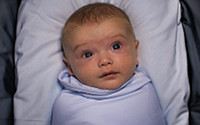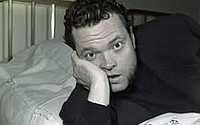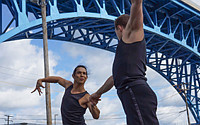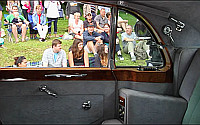| SHADOWS ON THE WALL | REVIEWS | NEWS | FESTIVAL | AWARDS | Q&A | ABOUT | TALKBACK | ||
 Shadows off the beaten path Shadows off the beaten path | ||
| Indies, foreigns, docs, revivals and shorts... | ||
|
On this page:
AMERICAN CIRCUMCISION THE EYES OF ORSON WELLES | HOT TO TROT | THE KING < < D O C S > > last update 28.Aug.18 See also: SHADOWS FILM FESTIVAL | ||
 R E V I E W B Y R I C H C L I N E
R E V I E W B Y R I C H C L I N E | ||
American Circumcision
| ||
|
dir-scr-prd Brendon Marotta with Georgeanne Chapin, Brian Morris, Dean Edell, Edgar Schoen, Glenn Calender, Soraya Mire, Marilyn Milos, John Geisheker, Fuambai Sia Ahmadu, Leonard Glick, Ronald Goldman, Andrew Freedman  release US 31.Aug.18
release US 31.Aug.1817/US 1h41 |
 This thorough documentary explores the USA's most common surgery, which people allow without discussion. So the nation has never had a conversation about the fact that America is the only nation that regularly practices non-religious circumcision. Basically a series of talking heads, the film feels overlong and one-sided, but it traverses a long-needed debate.
This thorough documentary explores the USA's most common surgery, which people allow without discussion. So the nation has never had a conversation about the fact that America is the only nation that regularly practices non-religious circumcision. Basically a series of talking heads, the film feels overlong and one-sided, but it traverses a long-needed debate.
Circumcision is the removal of the foreskin, including the five most sensitive parts of the penis. There are arguments for and against this, the biggest being that it benefits health, there has never been any proof of this aside from contested links to HIV and cancer. The film also goes into the history of circumcision in Jewish and other traditions. And also how the USA's push for the procedure is spreading to Africa both for infant boys and girls. The film opens with a shot of a superbly expressive little baby being taken into an operating room. From there, it's basically little more than interviews experts on both sides, plus people with personal experiences. There are also cutaways to protests, basic illustrations and one actual circumcision. Discussions clearly favour "intactivists" who have the most reasoned argument: altering the body is never better. There are also discussions around female circumcision, foreskin restoration and, most disturbingly, botched procedures. There's also a discussion of lasting psychological effects from the pain of circumcision: men don't recognise the harm done to them, but symptoms of trauma are there. Intriguingly, the film also explores religious angles, with Jewish perspectives as well as the repeated insistence in the New Testament that circumcision is not required. So it's an American custom, not a religious one, rooted in the Victorian belief that it reduced the urge for masturbation. The question is why the medical establishment comes up with a different disease each decade to argue in favour of it, using flawed statistics. In Europe, where circumcision isn't practiced, health stats are actually better. So blindly insisting on public health benefits seems spurious. The medical fact is that the foreskin is the most sensitive part of the male body. Men who had it removed in infancy can't understand the difference, so it seems obvious that men arguing for circumcision are those who don't want to admit that they've lost something. In other words, this is an argument based on the male ego. The film never makes this connection, but it does forcefully argue in favour of giving both men and women the ability to choose what happens to their own bodies. | |
|
15 themes, language, graphic imagery 28.Aug.18
| | |
 R E V I E W B Y R I C H C L I N E
R E V I E W B Y R I C H C L I N E | ||
The Eyes of Orson Welles

| ||
|
dir-scr Mark Cousins prd Mary Bell, Adam Dawtrey with Orson Welles, Beatrice Welles, Mark Cousins, Jack Klaff  release UK 17.Aug.18 18/UK 1h55 EDINBURGH FILM FEST
|  Literally a love letter to an iconic filmmaker, this documentary takes an unusual approach to the life and work of Orson Welles. Mainly using archival imagery, Mark Cousins explores Welles the artist, who reflected his experiences and passions in thousands of drawings. These images also echo through his films, revealing linked ideas and themes. It's an esoteric approach that feels long and oddly structured. But fans will love it.
Literally a love letter to an iconic filmmaker, this documentary takes an unusual approach to the life and work of Orson Welles. Mainly using archival imagery, Mark Cousins explores Welles the artist, who reflected his experiences and passions in thousands of drawings. These images also echo through his films, revealing linked ideas and themes. It's an esoteric approach that feels long and oddly structured. But fans will love it.
Cousins frames the film with a box of drawings he collects from Welles' New York archive, hundreds of pictures drawn with pencil, ink and/or water colours that reflect his personal life and travels, as well as plans for stage and film productions. Revealing a gifted observer of human physicality, these drawings are intriguing and insightful. And to structure the film, Cousins outlines Welles' career through a series of prototypes (such as pawn, knight, king, jester) to explore various aspects of Welles as an artist, writer, director and actor from his birth in 1915 to his death in 1985. It's fascinating to see these various strands of Welles' life woven together, including his romances with iconic women, his triumphs as a young performer on stage, radio and film, his struggles with Hollywood studios, and the various projects he was never able to finish. There's footage of all of this, including photos and clips of Welles through the decades. But by framing the documentary with Welles' drawings, the film sees him as an artist first and foremost. Aside from archival conversations involving Welles, the only other person interviewed is his youngest daughter Beatrice, who adds some casual reminiscences (and more drawings). The film also carries the heavy presence of Cousins himself, who narrates the doc as a missive directed at Welles, commenting on his career and personal life while asking him what he might make of changes in filmmaking the 21st century. The film's most fanciful touch is that the penultimate chapter is Welles' response (voiced by Klaff) to Cousins. All of this does go on a bit, circling around and perhaps spending too much time on things that seem peripheral. But it's also fascinating, a collection of wonderful clips including scenes from a lot of great films. It reminds us how many of Welles' movies didn't go the way he hoped they would, and makes us wish that the studios had allowed him to express himself artistically instead of forcing a kind of commerciality on him. And most of all, this doc reveals that Welles was a prolific illustrator whose observant, telling work deserves to be seen. | |
|
PG themes, imagery 31.Jul.18 | ||
 R E V I E W B Y R I C H C L I N E
R E V I E W B Y R I C H C L I N E | ||
Hot to Trot

| ||
|
dir-prd Gail Freedman with Ernesto Palma, Nikolai Shpakov, Kieren Jameson, Emily Coles, Robbie Tristan, Katerina Blinova, Barbara Zoloth, Mat Rosswood, John Ruocco, Mark Rosati, Elena Kruchkova, BW Lee  release US 24.Aug.18 18/US 1h28 |
 There's nothing particularly extraordinary about the dancers in this documentary, except that they happen to dance as same-sex couples. As what's called a "target" group, they have a remarkable sense of community. Not only are they gay, but most are immigrants as well, so most have had to leave their homes to find a place where they feel safe. And they take dancing seriously.
There's nothing particularly extraordinary about the dancers in this documentary, except that they happen to dance as same-sex couples. As what's called a "target" group, they have a remarkable sense of community. Not only are they gay, but most are immigrants as well, so most have had to leave their homes to find a place where they feel safe. And they take dancing seriously.
The same-sex ballroom competition April Follies has run in Oakland since 2003. Because they're matched by gender, partners can take turns leading and following as they compete around the world leading to the Gay Games every four years. The film focusses on two couples: Kieren and Emily in San Francisco, and Ernesto and Robbie in New York. Except that Robbie must suddenly return to Hungary for surgery. So Ernesto has to convince Nikolai to dance with a man for the first time. Both couples are preparing for the 2014 Follies, with the Gay Games in Cleveland four months later. Rehearsal scenes brim with energy and humour, camaraderie and passion, as successful soloist divas learn to work as partners. These people vividly show the joy of performing and how it helps in other areas of life, such as Kieren using dance to deal with depression and anxiety. Each dancer takes the camera crew into their home to meet their partners and parents. And over the course of the production, the cameras capture all kinds of challenges and changes in these dancers' lives. The relationships between the partners are intimate and remarkably engaging. Ernesto is the central figure, an immigrant from Costa Rica who grew up after a childhood of dancing. But he never had a role model who was like him. Moving to New York just seemed the only option, then he fell into drug addiction for five years. Each dancer recounts his or her specific story, all growing up in different countries with specific experiences both regarding dance and coming out as gay. Filmmaker Freedman takes us deeply into their personal lives, which makes the documentary about much more than just the dancing. It may seem odd, but ballroom is one of the most homophobic of the arts, as mainstream competitions won't even consider a same-sex partnerships. This doc exposes that for the bigotry it is, revealing the artistry and skill of these dancers, as well as the personal challenges they face. So in the end, this is a story about people and their powerfully moving journeys. They just happen to be dancers. | |
|
15 themes, language 19.Aug.18
| | |
 R E V I E W B Y R I C H C L I N E
R E V I E W B Y R I C H C L I N E | ||
The King
 MUST
MUST  SEE SEE
| ||
|
dir Eugene Jarecki scr Eugene Jarecki, Christopher St John prd Eugene Jarecki, Christopher St John, Christopher Frierson, Georgina Hill, David Kuhn with Eugene Jarecki, Ethan Hawke, Van Jones, Alec Baldwin, Chuck D, Ashton Kutcher, Mike Myers, James Carville, Leo 'Bud' Welch, Immortal Technique, Emmylou Harris, John Hiatt, Emi Sunshine  release US 22.Jun.18,
release US 22.Jun.18, UK 24.Aug.18 18/US Universal 1h47 SUNDANCE FILM FEST
|  While exploring the life of Elvis Presley in an unusual way, filmmaker Eugene Jarecki digs into the concept of the American dream. The parallels sometimes seem a little forced, but since he's shooting the film during the 2016 presidential election campaign, the point is very strong. This approach is perhaps a little jarring, but it's revealing in what it says about both Elvis and the USA.
While exploring the life of Elvis Presley in an unusual way, filmmaker Eugene Jarecki digs into the concept of the American dream. The parallels sometimes seem a little forced, but since he's shooting the film during the 2016 presidential election campaign, the point is very strong. This approach is perhaps a little jarring, but it's revealing in what it says about both Elvis and the USA.
Jarecki somehow gets his hands on Presley's classic Rolls Royce and fits it out with cameras to travel across America and interview a wide variety of people. He begins of course at Presley's birthplace in Mississippi, then continues to Memphis, Nashville, New York and across Route 66 to Las Vegas and Los Angeles. Along the way he explores Presley's musical roots, the controversy surrounding his appropriation of black music and the way his stardom exploded into film and television, ultimately leaving him as a caricature of himself. Yes, there are obvious echoes of this narrative in American history, especially leading up to this moment when voters have installed a man who so clearly wants to be the nation's undisputed king. Jarecki punches these connections all the way through the film, aided by outspoken interviewees who never guard their words. Some of them talk about their personal connections to Presley, others about the cultural implications, others about shared experiences. Presley's trajectory is typical in the USA, rising from working-class roots with a spark of talent that smart men (Sam Phillips and The Colonel) exploited to make millions. Success brought fame and its darker demons, soothed by addiction, leading to his death at just 42. In some ways, this is a frighteningly typical depiction of the American dream, because it's what everyone aspires to, thinking they'll be the ones who survive against the odds. The broader story about the nation's rise and fall is a slight stretch, since every generation has believed the world couldn't get much worse. But the rise of Trump and ignorant populism does indeed have a link with the false promise of celebrity, and the American public seems to be lapping it up with either adoration or outrage. So Jarecki's points about the true nature of US history are frighteningly on-the-nose. Can the nation's fate be much different than countless gifted icons who worked the system, crushed opposition, were manipulated themselves and crashed out far too young? | |
|
15 themes, language, violence 2.Aug.18 | ||


See also: SHADOWS FILM FESTIVAL © 2018 by Rich Cline, Shadows
on the Wall
| ||